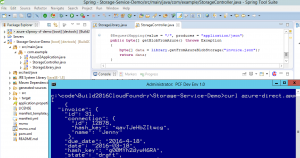Cloud Foundry and //Build
Last week at Microsoft's annual //Build developer conference, I partnered with Rita Zhang to demonstrate Pivotal Cloud Foundry on Azure. Cloud Foundry is an open source platform as a service (PaaS) technology that makes it easier for large companies to move to the cloud by first supporting deployment to the private cloud and then when they are ready transitioning to the public cloud. For large companies like Ford, the ease of use of Cloud Foundry makes it easier to move to Azure. Data sits in a variety of locations, and in a cloud agnostic world it is key that developers can access it without writing vendor-specific code.
Rita has helped to develop an S3 proxy, that supports getting data from both AWS S3 and Azure Storage from a single code base in Cloud Foundry. The S3Proxy solution can be hosted as a standalone Jetty application. In this scenario, the S3Proxy solution is deployed, managed, and scaled as its own application in Cloud Foundry so more apps can leverage it. Some users will use Cloud Foundry to adopt the cloud for the first time, and in these cases the developer can bypass the S3Proxy and use the Azure storage SDK directly in their new application.
The S3Proxy allows applications using the S3 API to access other storage back-ends, e.g., local file system, Google Cloud Storage, Microsoft Azure, OpenStack Swift. This application demonstrates how a user can setup S3Proxy in Cloud Foundry to use the same code base to get content from both AWS S3 and Azure Storage.
